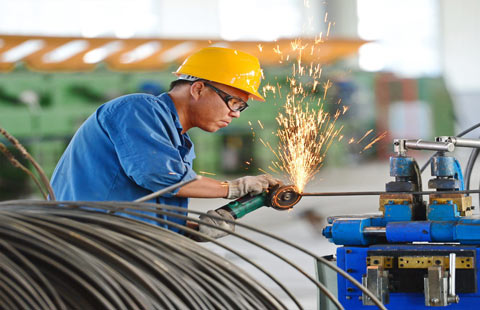China stands firm on monetary policy after Fed rate hike
BEIJING - The latest Federal Reserve interest rate hike may complicate matters for China's central bank but will not affect its monetary policy, which will remain prudent and neutral.
With the job market strengthening and inflation approaching its target, the Fed raised interest rates overnight by 25 basis points to a range of 0.75 percent -- 1.0 percent, only the third increase since the 2008 global financial crisis,.
Two more adjustments are expected this year, making life difficult for the People's Bank of China (PBOC) as it strives to keep the yuan stable and maintain the pace of economic recovery -- no easy task while constantly working to defuse financial risks.
Tom Orlik, chief Asia Economist at Bloomberg, believes the Fed has put the PBOC in a tricky position. He makes the point that the bank could easily have followed the Fed's lead and raised its own benchmark rates, supporting the yuan and reducing capital outflow, but at the risk of stymieing economic recovery.
Standing too firm, on the other hand, would bring the twin risks of a depreciating yuan and renewed capital flight. Instead, the PBOC chose a solution that "makes a lot of sense," leaving benchmark rates on hold and making use of targeted instruments.
Interest rates for both medium-term lending facility loans and reverse repos, the central bank's tools of choice for open market operations, rose 10 basis points. These higher rates reflect changes in the market without constituting a benchmark interest rate hike and do not signal any shift in monetary policy.
What these higher rates do indicate, however, is improving economies both at home and abroad and rising consumer prices, while constituting a prudent response to the Fed.
The PBOC is intent on keeping the China-US interest rate gap moderate to avoid heaping pressure on the yuan and running the risk of a capital flight, according to China Merchants Bank analyst Liu Dongliang.
Ren Zeping, chief economist at Founder Securities, sees no need for a benchmark rate hike as long as inflation remains mild and the nascent economic recovery fragile.
Instead of raising benchmark rates, Ren suggests the central bank opt for a structural interest rate hike while stabilizing the yuan.
The latest economic indicators have been as good as, or better than, expected: strong imports, producer inflation rising at its fastest in nearly nine years, industrial output on the up and fixed-asset investment growing steadily. Taken together, these factors suggest that the Chinese economy is moving in the right direction.
With the 2017 growth target set at around 6.5 percent, the lowest in a quarter of a century, and monetary policy rebranded as "prudent and neutral," China is aiming to increase M2 by around 12 percent this year, one percentage point lower last year's target.
New loans hit a record high last year, the third year in a row in excess of the 2009 level, when the country spent its way out of the global financial meltdown. While these loans provide the fuel for China's economic rebound, they come encumbered with the risk of asset bubbles. Left unchecked, these bubbles will threaten financial stability and darken the prospects for the broader economy.
According to the government work report released Thursday, China will build a "firewall" against financial risk, and keep careful watch on non-performing assets, bond defaults, shadow banking and Internet finance.
China's economy is likely to remain strong this year, which may allow the PBOC to continue to taper monetary easing, but any raise in benchmark rates this year would be a surprise. Economic recovery remains at a delicate stage, beset by uncertainties, and with investment sensitive to interest rate changes, CICC analyst Chang Huili said.























